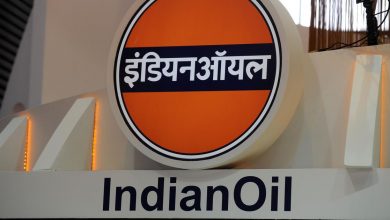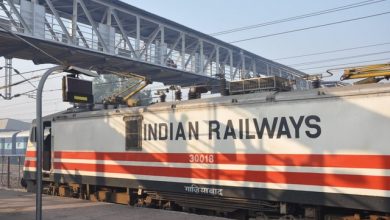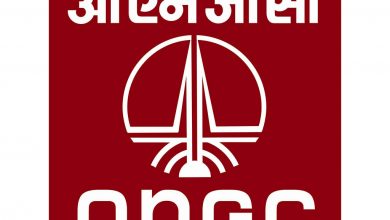Government Should Ratify 3 Core ILO Conventions : C. Srikumar, National Secretary, AITUC
The senior Trade Union leader was speaking at the International Labour Conclave Organised by Government of Kerala
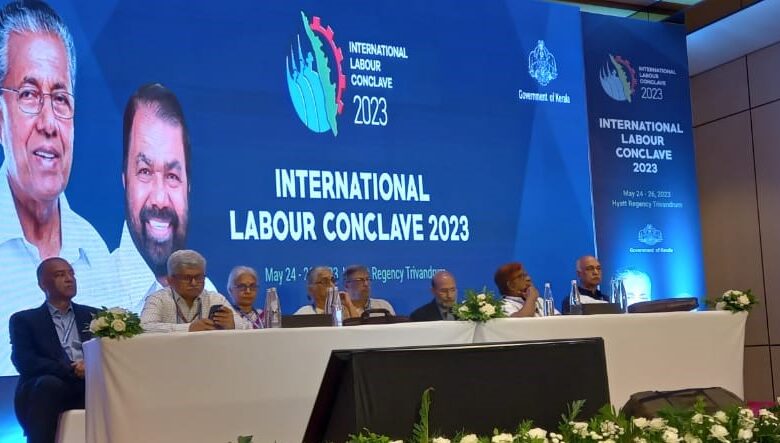
The LDF led Government of Kerala organised an International Labour Conclave at Thiruvananthapuram to Commemorate the association of ILO with India and Kerala from 24th May to 26th May.
Inaugurating the Conclave, Kerala Chief Minister Pinarayi Vijayan narrated his Government’s contribution towards the betterment of Working Class and formulating various welfare Schemes to the migrant and Unorganized Workers. The Conclave was divided into 7 important Technical Sessions with experts from Trade Unions, Employers, Legal and Academics.
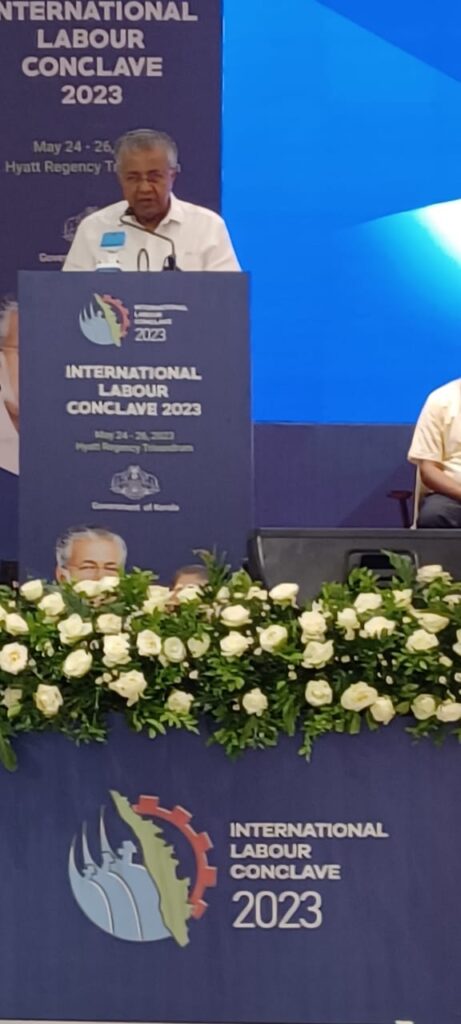
One of the Session was on Rights, Legislations and Social Protection which was presided by Parliament Member and veteran Trade Union Leader Elamram Kareem. The discussion was initiated by C. Srikumar, National Secretary of AITUC and Deputy General Secretary of WFTU. He made a detailed presentation on the theme. In his presentation, he urged upon the Government of India to immediately ratify the 3 Basic and Core Convention of ILO. He also appealed to the Kerala Government to support the Trade Unions in this regard.
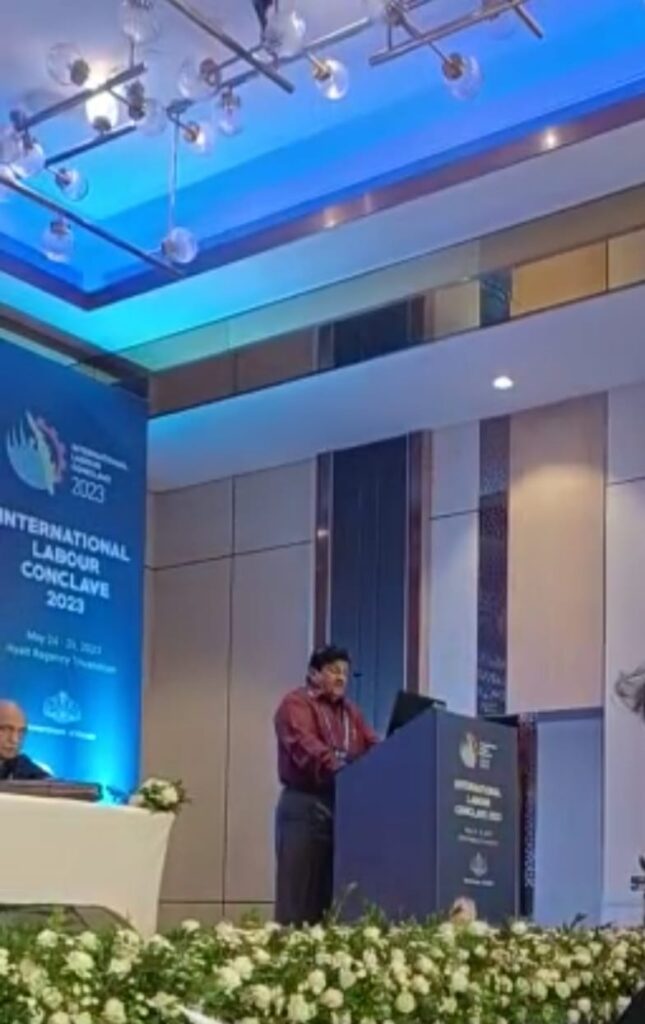
Extract from his speech made in the International Conclave is published here for the benefit of the viewers of www.indianpsu.com –
Kerala State Government deserves all appreciation for taking the initiative and conducting this International Labour Conclave at a crucial juncture, especially when the working class of the entire world including in India is under serious crisis and difficulties due to the Post COVID-19 developments of Job Loss, Closure of Industries, Price Rise, Unemployment and Economic Slowdown, etc. All the burdens on the COVID-19 Pandemic and the War between Russia and Ukraine are being passed over to the toiling masses.
The Working Class all over the world is fighting against this under the banner of World Federation of Trade Unions and its affiliated National Trade Unions of the respective Countries. Themes identified for this Conclave are excellent and it suits discussion and brain storming in the current situation. The role of Kerala Government in upholding the Objectives and Principles of ILO is laudable. It is a matter of satisfaction for all of us working in the All India Trade Union Congress (AITUC) and the World Federation of Trade Unions (WFTU) that Kerala has among the best records with respect to Workers Rights in the Global South. Kerala is also exceptional in protecting and advancing workers rights at a time when the Governments within India and all over the world neglect the voice of the Workers and also not involving the Trade Unions in the decision making process especially in matters concerning the Labour. With this introductory remark I now pass on to the topic given to me i.e. Rights, Legislation and Social Protection.
Workers Rights:
When we discuss about Workers Rights, it begins from the Human Rights to have a Decent and Dignified Work, Freedom of Union & Association, Equal opportunity, Protection against Discrimination & Exploitation, Harassment and Violence in the World of Work, etc. Workers Rights include the Rights in the Work place which can be classified as Health Conditions, Safety Conditions and Protection from Occupational Hazards and Risk, etc. Workers Rights are already laid down in the various International Conventions, Standards & Treaties. This includes the Universal declaration on Human Rights (Article 23 & 24 of 1948) and the International Conventions on Economic, Social & Cultural Rights. This provides for the Right of Citizens to the opportunity to gain their living by work which they freely chooses or accepts. Right of the Worker for just and favorable working conditions, wages which provides the Workers a minimum required facilities for decent living, equal pay for equal work thereby ensuring a dignified and decent living for themselves and their families is to be recognized by the Governments and the Employers. Career Advancement during his employment to a desired Higher Level, Rest, Leisure & Entertainment, Limitation of Working Hours, Holidays and Leave with Pay are all Part of the Workers Right. The ILO has already set out basic principles and Rights at Work. The ILO’s 8 Conventions are identified as “Fundamental” and “Basic” which deals with Freedom of Association, Collective Bargaining, Equal Remuneration, Non Discrimination and eliminating Forced and Child Labour. The Non Fundamental ILO Conventions cover issues from Wages, Working Hours, Occupational health and Safety, Maternity Protection and Social Security. Apart from the above the UN Guiding Principles on Business and Human Rights also highlights the Government’s responsibility to have adequate laws in place to protect worker’s rights, give guidance to the Industry and Business on what is expected of them to ensure adequate enforcement of these laws.
It is pertinent to mention here that even though India is a founder member of ILO, Government of India has not ratified the 3 Core and Fundamental Conventions namely:-
- Freedom of Association and Protection of the Right to Organise Convention 1948 (No.87).
- Right to Organise and Collective Bargaining Convention 1949 (No.98).
- Elimination of Violence and Harassment in the World of Work Convention 2019 (No.190).
I appeal through this International Labour Conclave to the Government of India as founder member of ILO to immediately ratify the above three important and Basic Conventions.
Legislation:
So far as India is concerned there are numerous provisions in our Constitution and also in the Labour Laws that protect the interest of the employees. Our Constitution framed by the National Leaders under the Chairmanship of Dr. Baba Saheb Ambedkar is the foundation of Individual Rights and Liberties and that is the basic frame work under which all Labour Legislations and other Legislations should operate. Labour Laws of our Country recognizes the Rights of the Labour equivalent to that of the Employers Rights. These Rights protects the employees from any type of discrimination on the basis of Gender, Age, Ethnicity, Caste or Religion. Employees have the Right for Fair Wages, Paid Holidays and Leave, Prescribed Working Hours, Intervals, etc. There are multiple provisions in the Labour Laws which protects the employees. According to Factories Act, 1948 no worker can be forced to work beyond 8 Hours without appropriate compensation such as Overtime Wages at double the rate, etc. Under the Factories Act workers are entitled to Basic Health and Safety Rights at workplace, it is the responsibility of the employer to provide all basic amenities. If an employee is injured due to accident/unsafe conditions while on duty, the employer is liable to pay compensation to the employee under the Employees Compensation Act 1923. There is a Minimum Wages Act of 1948 in which every employee is entitled for a minimum payment that is sufficient to support himself and his family. Wages that are less than the minimum wage is a clear violation of Article 23 of the Constitution of India.
Women Employees are entitled for 26 Week of Maternity Leave under the Maternity Benefit Act of 2017. Subsequently a Bill on Paternity Leave also has been introduced in the Parliament with the goal of providing paternity leave to the Male Workers. Payment of Gratuity Act of 1972 ensures a Retirement Fund as a Terminal Benefit to the employees. The Employees Provident Fund and Miscellaneous Provisions Act 1952 extends a Social Protection and Old Age Protection to the employees. The Sexual Harassment of Women at workplace (Prevention, Prohibition and Redressal) Act of 2013 Protects Women in the workplace from sexual harassment. Sexual Harassment according to the Supreme Court is a Violation of Working Women’s Fundamental Rights. In fact the Famous Judgement in the case of Vishaka and others vs State of Rajasthan, the Supreme Court established Advancements of Rules on Sexual Harassment. The Industrial Dispute Act 1947 carries various provisions to redress Industrial Disputes and also relief to the workers in different circumstances like Lay Off, Lockouts and Strikes, etc. All the above Labour Laws and other Labour Legislations are an outcome of the Century old Struggle of the Indian Working Class. Unfortunately, all these Labour Laws are being tinkered and reduced as 4 Labour Codes which the workers and the Trade Unions are vehemently opposing. Even though many State Governments have adopted the Labour Codes, we are happy that the Kerala Government has not adopted the Anti-Worker Labour Codes.
Social Protection:
We have discussed in brief about the International Human Rights Law, Workers Rights and Labour Legislation. Now let us discuss about the obligation of the Government / State to provide Social Protection. Article 25(1) of the Universal declaration of Human Rights reads as follows: “Everyone has the right to a standard of living adequate for the health and well-being of himself and of his family, including food, clothing, housing and medical care and necessary social services, and the right to security in the event of unemployment, sickness, disability, widowhood, old age or other lack of livelihood in circumstances beyond his control.” In accordance with the above it is obligatory on the part of the States and the Governments to provide Social Protection and Social Security to the Workers, this includes Social Insurance Schemes and Social Assistance Schemes. Social Protection measures should ensure protection against lack of Income caused by Sickness, Disability, Uemployment, Employment related Accident and Injury, Old Age Protection. Protection of the family due to the death of the employees are a few. The schemes includes Unemployment or Disability Benefits, Old Age Pension, Family Pension, Subsidised Transport and Food Services, etc. Even though various Governments introduces and implement different Social Protection Schemes what is lacking is its enforcement and monitoring. Therefore the Government’s should ensure that the benefits of the various Social Protection Schemes reaches the workers and their family. Physical accessibility of the Schemes for the beneficiaries should be made simple and affordable.
Governments should also ensure that social protection is equally available to everyone. Governments should also ensure that there is no discriminatory exclusion from Social Security and other forms of Social Protection. A Welfare State should always provide basic requirements and essentials such as Food, Potable Water, Housing, Education, Sanitation and Health Care facilities. Similarly considering today’s requirement of Life and Lifestyle, wages may be fixed in such a manner to provide a decent living wage. These benefits cannot be taken away on the plea of limited resources, etc. Government has to increase its revenue resources and distribute the same in such a manner that ensures Human Rights especially for the protection of the disadvantaged and marginalized individuals or sections. Another area of concern when we discuss about Social Protection is about the needs of migrant workers and the workers in the informal economy, gig workers, domestic workers, Government Scheme Workers like Anganwadi, ASHA and Midday Meal Scheme workers, etc. Many of these workers are Women. Whatever relief package given to them has not met the real needs of the migrant and informal workers. Corruption is another major area which affects the Social Security and Social Protection. To prevent Corruption and misuse of Public funds allotted for Social Security and Social Protection, there should be total transparency in the spending, representatives of the Trade Unions should be there in the decision making machineries and its implementation process. Proper Auditing of these funds are also essential.
Conclusion:
In this paper whatever I have dealt is the experience which I have gained by working in the Trade Unions in different Sectors at the National Level and Industry Level. This is not a comprehensive note which deals with all the three topics of Rights, Legislation and Social Protection. I have just made a passing remarks by sharing my experiences. The experience of any financial crisis, whether it is due to Economic Meltdown, Covid-19 Pandemic, Natural Calamities, Uncontrollable Price Rise, War, etc. the burden is always transferred to the shoulders of the Workers and the so called austerity measures only increased the inequalities and affected the standard of living of the Working People. It has also increased homelessness, the number of people in poverty and distress, etc. Governments should learn lessons from these bitter experiences and should ensure proper public spending on all the social welfare and social security measures and policies. A situation where rich becomes more richer and poor becomes more poorer should be eliminated by ensuring that all the resources reaches the needy people on time. I am confident that the initiative taken by the Kerala Government to have discussions and brain storming sessions towards this direction will go a long way in building up a socialist society which is free from all
types of exploitation and which strengthen the public institutions to support services that promote all basic amenities and requirement with universal access to all essential services.

